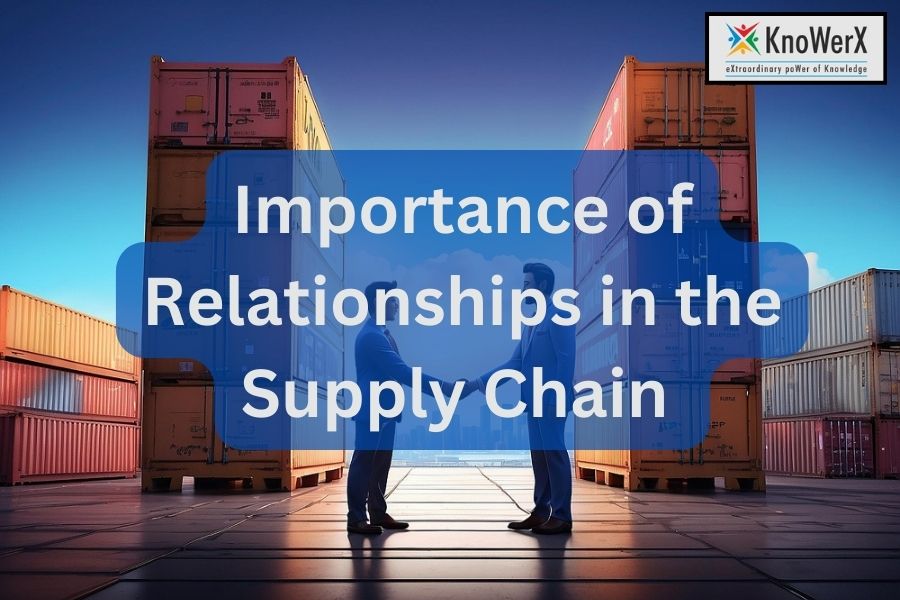Know Importance of Relationships in the Supply Chain

Strong supply chain relationships are the backbone of efficient logistics, cost savings, and business success. A well-connected network of suppliers, vendors, and distributors ensures smooth operations, minimises risks, and enhances overall efficiency. Here are some key tips to build and maintain effective relationships in your supply chain:
1. Prioritise Communication & Transparency
Clear, open communication fosters trust and ensures smooth collaboration between suppliers, manufacturers, and distributors. Regular updates and honest feedback can help prevent disruptions and improve overall efficiency. Using digital communication tools, such as supplier portals and real-time tracking systems, enhances visibility across the supply chain. Businesses that prioritise transparent reporting and data sharing build stronger, more resilient supply chain relationships.
2. Foster Long-Term Partnerships
Rather than focusing solely on short-term gains, investing in long-term supplier and vendor relationships leads to better negotiations, improved service levels, and shared growth opportunities. A committed partnership encourages suppliers to provide better pricing, innovation, and quality improvements. Consistently working with trusted partners reduces risks, strengthens market position, and enhances supply chain stability.
3. Leverage Technology for Better Collaboration
Using digital platforms, such as cloud-based supply chain management systems, improves visibility, coordination, and real-time data sharing. Technology enables automated order tracking, predictive analytics, and demand forecasting, reducing inefficiencies. Companies that embrace digital transformation in supply chain relationships gain a competitive edge by improving speed, accuracy, and cost-effectiveness.
4. Establish Mutual Goals & Expectations
Aligning objectives between partners ensures that all stakeholders work towards common business goals. Clearly defined key performance indicators (KPIs) and service level agreements (SLAs) help maintain accountability and track progress. Regular performance reviews and joint strategy meetings can further enhance coordination, ensuring all parties contribute to shared success.
5. Invest in Supplier & Vendor Development
Training and development initiatives for suppliers and vendors create a stronger, more reliable supply chain. Providing access to best practices, industry certifications, and process improvements can help partners enhance their efficiency and capabilities. A well-trained supplier base improves product quality, reduces defects, and enhances overall customer satisfaction, strengthening long-term supply chain relationships.
6. Manage Risks Collaboratively
Uncertainties like market fluctuations, geopolitical factors, and natural disasters impact supply chains. A proactive approach to risk management, including joint contingency planning with partners, ensures minimal disruptions. Developing alternative sourcing strategies, maintaining buffer stocks, and sharing risk mitigation plans with stakeholders strengthen overall supply chain resilience.
7. Encourage Ethical & Sustainable Practices
Ethical sourcing, fair trade, and sustainability initiatives contribute to long-lasting supply chain relationships. Businesses that prioritise social responsibility build a positive brand reputation and attract environmentally conscious consumers. Implementing sustainable packaging, reducing carbon footprints, and ensuring ethical labour practices help foster trust and long-term partnerships.
Frequently Asked Questions
Why are strong relationships important in the supply chain?
Strong relationships in the supply chain foster trust, collaboration, and efficiency. They help minimise risks, reduce costs, and ensure smooth operations, ultimately contributing to long-term business success.
How does communication improve supply chain relationships?
Clear and transparent communication builds trust, prevents misunderstandings, and ensures all parties are aligned. Tools like supplier portals and real-time tracking systems enhance visibility and coordination.
What are the benefits of long-term partnerships in the supply chain?
Long-term partnerships lead to better pricing, improved service levels, and shared growth opportunities. They also reduce risks, enhance supply chain stability, and encourage innovation and quality improvements.
How can technology improve supply chain collaboration?
Technology, such as cloud-based supply chain management systems, enables real-time data sharing, automated tracking, and predictive analytics. This improves efficiency, accuracy, and cost-effectiveness.
Ending Notes

Building strong supply chain relationships is crucial for operational efficiency, cost optimisation, and long-term business success. Companies that focus on communication, collaboration, and innovation create a more resilient and competitive supply chain.
At KnoWerX, we equip professionals with the expertise to master supply chain relationships through our industry-leading training programs and certifications. Strengthen your knowledge with us and drive your supply chain success!
Image Reference: Freepik
Disclaimer: All trademarks, logos, and brand names are the property of their respective owners. All company, product, and service names used in this website are for identification purposes only. Use of these names, trademarks, and brands does not imply endorsement.



